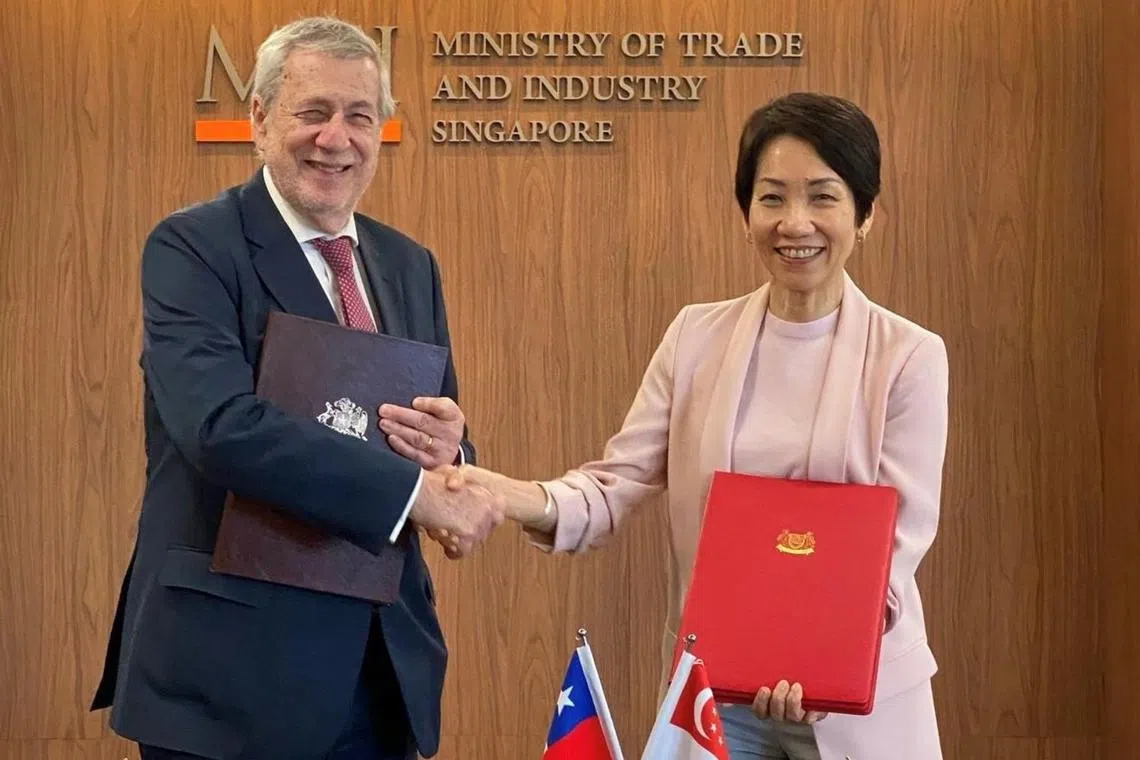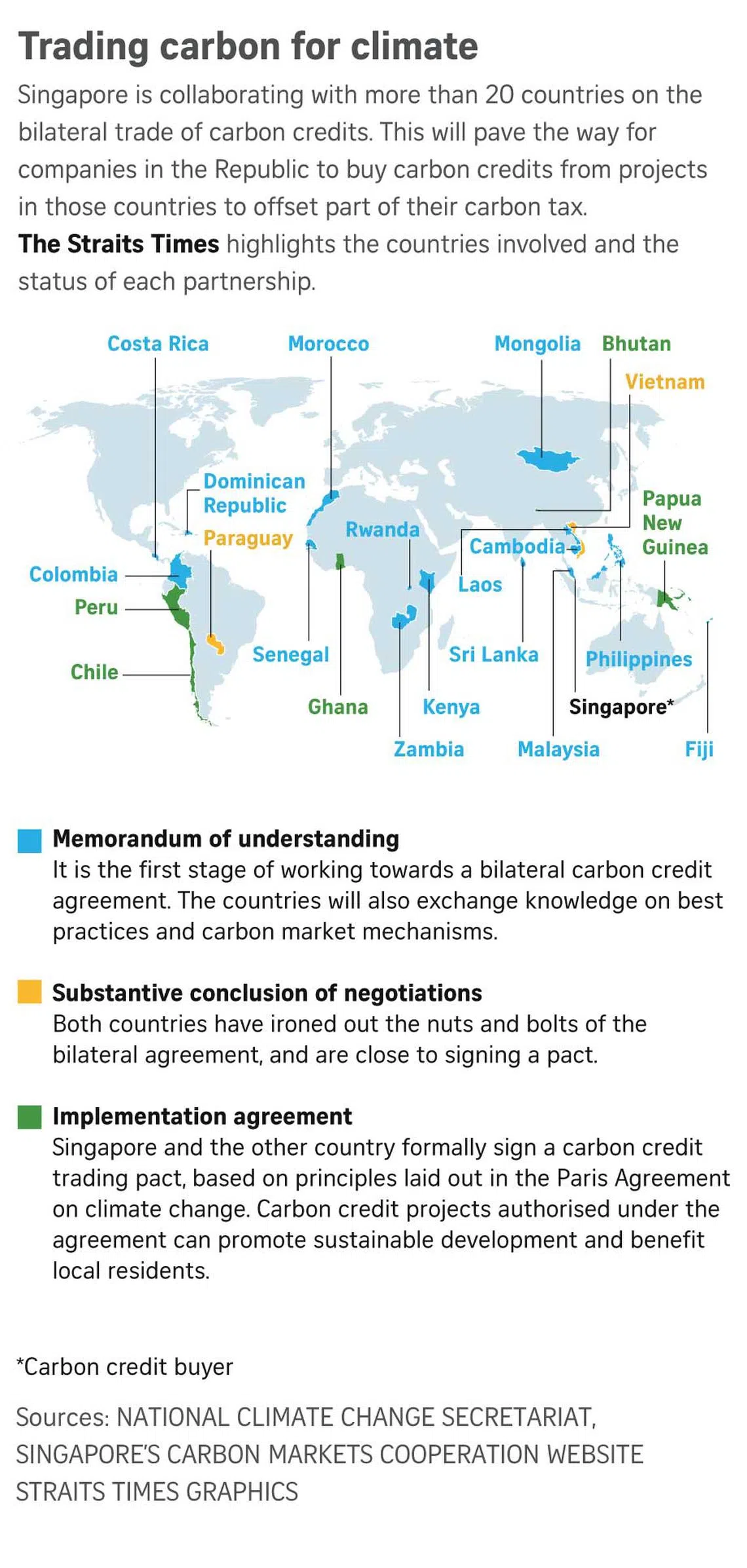Chile inks carbon trading pact with Singapore, fifth country to do so
Sign up now: Get ST's newsletters delivered to your inbox

The implementation agreement to collaborate on carbon credits was signed by Minister for Sustainability and the Environment Grace Fu and Chile’s Minister of Foreign Affairs Alberto van Klaveren on April 7.
PHOTO: MINISTRY OF TRADE AND INDUSTRY
SINGAPORE – Chile has become the fifth country that can sell carbon credits to Singapore, after both nations inked a carbon trading agreement on April 7.
Singapore has similar pacts with Papua New Guinea, Ghana, Bhutan
Under the Paris Agreement, countries can buy carbon credits generated in other nations or regions to meet domestic climate targets. Singapore had earlier estimated that it would use high-quality carbon credits to offset about 2.5 million tonnes of emissions per year from 2021 to 2030.
For example, the country’s total emissions in 2030 are expected to be 62.51 million tonnes and will be brought down to 60 million tonnes with the use of carbon credits.
Credits used to offset national emissions can be purchased only from carbon projects in countries that have bilateral pacts with Singapore, formally known as implementation agreements. Buyers of carbon credits can include countries or companies, but the Republic has not yet purchased such offsets.
Through these agreements, carbon tax-liable companies here can also buy carbon credits from projects in partner countries to offset up to 5 per cent of their taxable emissions.
One carbon credit represents one tonne of carbon dioxide that is either removed from the atmosphere or prevented from being released, such as when a forest is saved from logging.
The implementation agreement on April 7 was signed by Minister for Sustainability and the Environment Grace Fu and Chile’s Minister of Foreign Affairs Alberto van Klaveren, who is on an official visit to Singapore from April 6 to 8.
Singapore and Chile marked 45 years of diplomatic relations in 2024. Both countries have worked together on various initiatives, said Ms Fu, citing the Comprehensive and Progressive Agreement for Trans-Pacific Partnership, Pacific Alliance-Singapore Free Trade Agreement and Digital Economy Partnership Agreement.
“This implementation agreement will unlock additional mitigation potential in Chile and will help Singapore meet our climate target while bringing climate investments into Chile. I look forward to active private-sector participation when we operationalise this agreement,” said Ms Fu.
The Ministry of Trade and Industry (MTI) said details on the approved carbon credit projects and methodologies will be published in due course. Currently, only information for Papua New Guinea and Ghana is available online.
This is the third implementation agreement Singapore has signed in 2025. Its pact with Bhutan was inked in late February.
Singapore will voluntarily contribute the equivalent of 5 per cent of the proceeds from the carbon credits it eventually buys to help the current five carbon project-hosting countries reduce the impact of climate change.
For Chile, the eligible carbon projects will promote sustainable development and deliver benefits to local communities, such as new jobs and better energy security, MTI said on April 7.
Singapore is also progressing in carbon trading negotiations with more than 15 other countries including Malaysia, Cambodia and Colombia.
In another move, the Republic is looking to buy its first set of nature-based carbon offsets overseas. It called on carbon project developers and credit suppliers to propose nature-based projects that can deliver at least 500,000 credits each.
There are two main types of carbon credits – nature-based and technological, such as carbon capture. Nature-based credits could come from projects such as forest restoration and conservation, as well as sustainable agriculture.
The request for proposal drew 17 submissions before it closed in mid-February. Another call for proposals for other high-quality credits is expected later in 2025.
Carbon trading is governed under a segment of the Paris Agreement known as Article 6, which was finalised at the UN Climate Change Conference in Azerbaijan in November 2024 after nearly 10 years of negotiations.
“Given the relatively nascent development of the Article 6 carbon markets, and the uncertainties of risks associated with Article 6 transactions, it is sensible that the Singapore Government is leveraging multiple partnerships as part of its (credits) sourcing strategy,” said Mr Rueban Manokara, global lead of the carbon finance and markets task force at conservation group World Wide Fund for Nature.
Setting up offshore wind power plants and green hydrogen projects, and removing carbon dioxide through afforestation and reforestation are possible carbon projects that can be hosted in Chile, said Mr Manokara.
For a project to produce high-quality credits, it must prove that the project would not have been viable without the revenue from selling carbon credits.
This requirement can be met for offshore wind power plants because they are costlier to implement than most on-land wind power projects, said Mr Manokara.
According to the International Energy Agency, renewables comprised 55 per cent of Chile’s power generation in 2022. The South American country has also emerged as a world-class destination for solar and wind energy developers.
“Given the strong renewable energy potential in Chile, the generation of green hydrogen could also be a ‘high-hanging fruit’ project type that has potential to be implemented there,” Mr Manokara said.
Green hydrogen is produced by using renewable energy to split water molecules into hydrogen and oxygen. Hydrogen, when used as fuel, does not produce carbon dioxide.
Associate Professor Daniel Lee, director of the Carbon Markets Academy of Singapore at Nanyang Technological University, said Singapore’s initiatives also act as a catalyst for the carbon market by providing a secure source of demand for high-quality projects.
Ms Marianne Tan, associate director of policy and strategy for the Asia-Pacific at climate consultancy South Pole, said: “For countries transferring (credits), new low-carbon solutions receive financing they would otherwise not have been able to access.”
Singapore’s deal with Chile, its third in two months, is “encouraging”, she said, and “could be an indication that Article 6 participation is reaching an inflection point for uptake globally”.
Shabana Begum is a correspondent, with a focus on environment and science, at The Straits Times.




